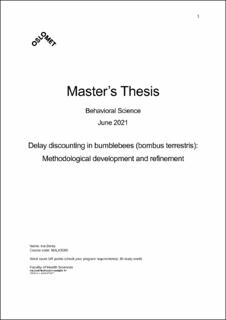| dc.description.abstract | Whereas the ecological analysis hypotheses suggests that self-control is adaptive and context dependent, and influenced by long-term fitness, the metabolic hypotheses suggests that self-control negatively correlates organism’s metabolic rate. Bumblebees have a high metabolic rate and are highly eusocial. Thus, examining delay discounting in bumblebees may provide valuable knowledge about interspecies variation in self-control, and inform assumption made by both hypotheses. To do that, delay-discounting procedures accounting for bumblebee’s particularities as a specie should be developed. The present study aimed to test and refine a procedure made to study preference reversal as a measure of self-control in bumblebees (bombus terrestris). Preference reversal was investigated by systematically increasing the delay to access a sweeter reinforcer (5, 10, 15, 20, 25, 30, 35, 40, 45. 50, 60, 70… seconds) in an adjusting delay procedure. Five bumblebees were tested to find the point where they showed preference reversal by choosing less sweet immediate reinforcer. On average, the bumblebees showed preference reversal at 50 s delay in phase 1 and at 55 s in phase 2. Intertrial interval were stable across conditions, showing no systematic variation when delays were increased. Procedural solutions regarding the definitions of choice and method of adjusting delays are discussed. | en_US |
